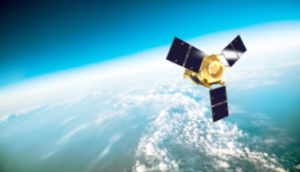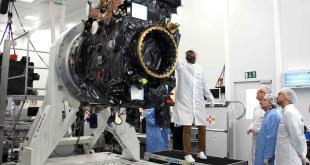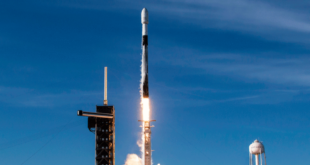
The Azeri ambassador to Saudi Arabia, Shahin Abdullayev, has told reporters that Azerbaijan seeks to enter into cooperative agreements with Saudi Arabia in satellite technology, petrochemicals, energy, agriculture, and tourism.
“We launched two satellites and we reached advanced levels in this sector. We aim to be among the top producers of satellite parts,” Ambassador Abdullayev told the Asharq Al-Awsat newspaper on 23 March 2018.
Ambassador Abdullayev noted that diplomatic and economic ties between Azerbaijan and Saudi Arabia are in excellent condition, but suggested that in trade there is room for significant improvement. In 2017 trade between the two countries is estimated to be worth U.S.$17 million.
Ambassador Abdullayev’s made his remarks after meeting with Ahmed al-Rajhi, the Chairman of the Saudi Chambers of Commerce, in Riyadh, the Saudi capital city.
Azerbaijan boasts the only established space programme in the Caucasus, run through Azercosmos – an open joint stock company wholly owned by the Government of Azerbaijan through its Ministry of Communications and Information Technologies.
Azercosmos owns and operates the AzerSpace-1A communications satellite built by Orbital ATK in the United States and launched in 2013. In cooperation with Intelsat, Azercosmos will also operate AzerSpace-2 to be located at the 45° East orbital position after its launch later in 2018. AzerSpace-2 will supplement the services of AzerSpace-1A by providing government and commercial communication services, as well as broadcasting Direct-to-Home satellite television.
Azercosmos also operates the AzerSky Earth observation satellite, previously operated by the French commercial Earth observation operator Airbus’ Satellite Probatoire de l’Observation de la Terre (SPOT) as SPOT-7. Operations of SPOT-7 were transferred to Azercosmos in 2014 whereupon it was renamed AzerSky. That agreement also allows Azercosmos access to other Airbus-owned Earth observation satellites, to include SPOT-6, the Pléiades-HR 1 and 2 high-resolution electro-optical satellites, and to the TerraSAR-X and TanDEM-X synthetic aperture radar imaging satellites.
Azerbaijan is also looking to position itself as part of the global supply chain for satellite components as well as services.
Saudi Arabia is also developing its own space programme, albeit less conspicuously than other countries in the region. Saudi Arabia is already host to the pan-Arabian satellite communications consortium, Arabsat, but a range of satellite and space science projects are underway at the King Abdulaziz City for Science and Technology (KACST), to include communication and Earth observation satellites as well as scientific instruments, including one for the Chinese Chang’e 5 lunar lander.
Saudi company Taqnia Space and KACST are also building a constellation of small high-resolution Earth observation satellites, to be called Scout, in cooperation with U.S. satellite imagery provider DigitalGlobe.
The Saudi space sector is a critically important part of Vision 2030, the ambitious economic diversification and social reform programme instituted in 2016 by the Crown Prince, Mohammed bin Salman, by providing skilled jobs, scientific and technical capacity, as well as indigenous capabilities.
 SpaceWatch.Global An independent perspective on space
SpaceWatch.Global An independent perspective on space




